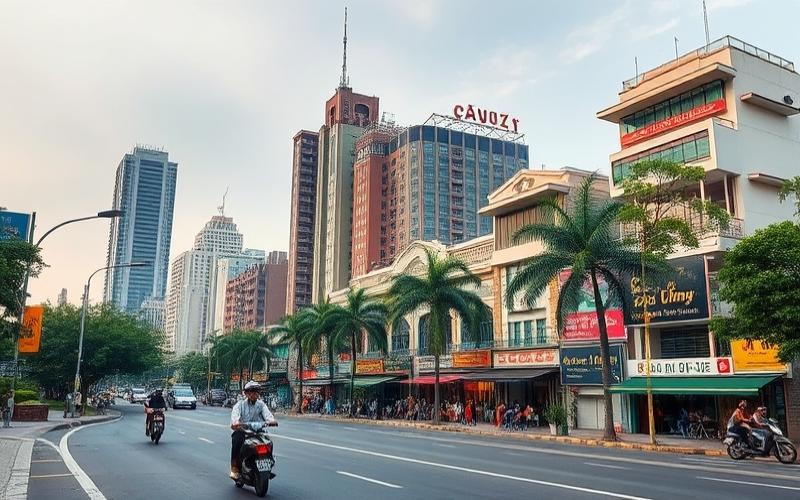
 Published on and written by Cyril Jarnias
Published on and written by Cyril Jarnias
In an expanding economic context, Vietnam positions itself as a prime destination for real estate investors attracted by lucrative opportunities and a dynamic market.
In addition to its rapid growth, the country offers attractive tax benefits that enhance the appeal of real estate investment. These tax incentives serve as a strategic tool of the Vietnamese government to stimulate foreign investment while revitalizing the local real estate sector.
This article examines the various deductions and tax credits available, providing an essential guide for anyone looking to maximize their returns in this promising market.
Exploring Vietnamese Local Taxation for Real Estate Investors
Legal Framework of Local Taxation on Real Estate Investment in Vietnam
Real estate investors in Vietnam are subject to several types of local taxes, primarily land tax, real estate property tax (especially during acquisition or sale), as well as taxes related to rental operations.
| Tax / Levy | Tax Base | Current Rate | Specifics |
| Land Tax | Land area | 0.03% to 0.15%/m² | Varies by province and property type |
| Registration Tax | Value of acquired property | 0.5% | Payable upon property transfer |
| VAT (sale of new property) | Sale price | 10% | Also applies to foreigners |
| Personal Income Tax (PIT) – resale | Total transaction amount | 2% | On each transfer |
| PIT – rental income | Annual rental income | Generally: VAT: 5%, PIT: 5% + license tax if >1,500,000 VND/month |
Concrete Examples and Regional Disparities
- In Hanoi or Ho Chi Minh City: rates generally close to the national maximum for residential land (up to 0.15%/m²/year) due to their attractiveness.
- In some rural or less developed provinces: rates around 0.03%/m²/year, sometimes with temporary exemptions to encourage real estate development.
Tax Exemptions and Reductions
- Local authorities may provide:
- Partial or full exemptions during an initial period (often between one and three years), particularly in special economic zones or for certain types of projects promoting social housing.
- Targeted reductions for investments contributing to sustainable urban development or in priority sectors designated by the state.
Practical example:
In a newly created industrial zone near Hai Phong, some developers benefit from a full land tax exemption for five years to attract capital and jobs.
Administrative Procedures
- Tax declaration:
- The investor must declare their real estate acquisitions to the competent local tax office.
- The declaration must be made before any official transaction at the public notary.
- Payment:
- Taxes are generally paid by bank transfer directly to the local Treasury after a tax notice is issued.
- Required documents:
- Land Certificate/Land Use Right (“DUT”)
- Authenticated contract
- Identity proof
- For rental income:
- Quarterly or annual filing depending on amount received
- Online payment possible in several major cities
Practical Tips to Optimize Local Taxation
- Consult a specialized Vietnamese accounting firm at the start of the project; they are precisely familiar with the local specifics applicable to the targeted province.
- Regularly inquire about temporary incentive policies that can significantly reduce tax pressure in the initial phase.
- Prefer certain validated legal structures allowing efficient management between private/direct holding and via a locally registered company—each structure has its specific tax advantages depending on investor profile/expected returns.
***
Foreign investors not fully mastering these procedures or not fluent in Vietnamese are recommended to systematically use a licensed local accountant. This ensures not only strict compliance with regulations but also optimization adapted to the frequent changes in Vietnamese legal texts governing real estate.
Good to know:
Real estate investors in Vietnam must navigate a complex local tax framework, encompassing land tax and real estate property tax. Land tax is generally calculated based on the land value and can vary significantly between provinces, with Ho Chi Minh City, for example, showing an average rate of 0.2% compared to 0.1% in rural areas. Real estate property taxes, on the other hand, consider the value of constructions and can go up to 0.3% in some urban regions. To stimulate investment, some provinces offer exemptions or reductions for specific development projects, such as eco-districts or tourist complexes. To settle these taxes, investors must file an annual declaration with local tax authorities. It is advisable to work closely with Vietnamese tax experts to optimize their tax burden, taking into account available tax incentives and regional specifics that can significantly affect investment profitability.
International Tax Strategies to Avoid Double Taxation
Vietnam has concluded bilateral double taxation agreements (DTAs) with over 80 countries, including France, Germany, the United Kingdom, Japan, South Korea, Singapore, China, Australia, and many other major economic partners. These agreements aim to avoid double taxation of income for individuals and corporations operating in multiple jurisdictions, while facilitating cross-border investments, particularly in real estate.
| Notable Countries with a DTA with Vietnam |
| France |
| Germany |
| United Kingdom |
| Japan |
| South Korea |
| Singapore |
| China |
| Australia |
| Russia |
| Malaysia |
Benefits for Foreign Real Estate Investors:
- Reduction or elimination of double taxation on rental income, real estate capital gains, and dividends from investments in Vietnam.
- Increased legal security thanks to the clear definition of taxing rights between Vietnam and the investor’s country of residence.
- Possibility to repatriate net profits with reduced taxation according to the applicable agreement.
Main International Tax Planning Techniques:
- Tax credit: Tax paid in Vietnam on real estate income can be deducted from the tax due in the investor’s country of residence, within the limit provided by the DTA.
- Exemption of repatriated profits: Some agreements provide for full or partial exemption from tax on dividends, interest, or capital gains repatriated to the home country.
- Structuring via entities located in jurisdictions with favorable DTAs to optimize the overall tax burden.
- Use of compliant transfer pricing to avoid tax adjustments during international intra-group transactions.
Legal Provisions and Local Taxation Supporting Real Estate Investment:
- Long-term property rights for foreign investors in certain residential and commercial projects.
- Competitive corporate tax rates (generally 20% on profits).
- Temporary tax exemptions for certain real estate projects, particularly in special economic zones or industrial zones.
- Simplified procedures for registering foreign investments and creating foreign-capital entities.
Concrete Example:
A French investor acquires a rental building in Ho Chi Minh City via a 100% locally owned company. The rental income received is taxed in Vietnam at a rate of 20%. Thanks to the Vietnam-France DTA, the investor benefits from a tax credit in France equivalent to the tax already paid in Vietnam, thus avoiding double taxation on this income. Dividends repatriated to France may also be exempt or subject to a reduced rate, according to the terms of the agreement.
Case Study:
A Singaporean company invests in a commercial complex in Hanoi. Under the Vietnam-Singapore DTA, dividends paid to the parent company in Singapore are subject to a reduced withholding tax (for example, 5% instead of 10%), and Singapore grants a tax credit for the tax paid in Vietnam. This structure optimizes the net profitability of the investment.
Compliance and Tax Risk Management for Investors:
- Obligation to comply with local formalities to benefit from DTA advantages (request for tax residence certificates, appropriate documentation, notification to the Vietnamese tax administration).
- Need for increased vigilance regarding documentation (proof of financial flows, contracts, investment decisions) to protect against tax adjustments.
- Monitoring of legislative developments and international negotiations, particularly the OECD/G20 BEPS (Base Erosion and Profit Shifting) rules, which aim to limit aggressive optimization practices.
- Risk of financial penalties or disputes if transparency, economic substance, or reporting requirements are not met.
Key Takeaway:
Double taxation agreements and Vietnamese local taxation offer an attractive framework for foreign real estate investment, provided that compliance, documentation, and international tax planning tailored to each situation are mastered.
Good to know:
Vietnam is a signatory to numerous bilateral agreements to avoid double taxation, thereby facilitating foreign real estate investors in reducing tax burdens by avoiding multiple taxation on the same income. For example, these agreements often allow the use of tax credits on gains obtained abroad or exempt repatriated profits from taxation. In terms of local taxation, Vietnamese law offers temporary exemptions or targeted tax relief for investments in certain real estate sectors or special economic zones, which constitutes an additional attraction for international investors. However, to fully benefit from these measures, investors must ensure rigorous compliance with Vietnamese and international regulations to minimize potential tax risks, as demonstrated by case studies where non-compliance resulted in significant penalties.
Decoding Land Tax and Property Tax in Vietnam
Definitions and Differences Between Land Tax and Property Tax in Vietnam
- Land Tax: Annual tax paid by real estate owners (individuals or entities) on the value and/or area of the owned property, whether residential, commercial, or agricultural land. It aims to regulate land use, fund public services, limit speculation, and redistribute resources.
- Property Tax: Historically applied to occupants of a dwelling (owners or tenants), this tax is no longer in effect on buildings in Vietnam since 1992. Currently, taxation primarily focuses on land, not on housing occupancy.
| Characteristic | Land Tax | Property Tax |
|---|---|---|
| Taxable Subject | Land/property owner | Occupant (owner/tenant) |
| Calculation Base | Land value/area | Living area x price/m² |
| Current Status in VN | Applied | Not applied since 1992 |
Usual Tax Rates and Calculation Base
- The current land tax is primarily a “non-agricultural tax,” with a rate generally ranging between 0.03% to 0.15% of the cadastral value for each type of land.
- A recent project proposes a progressive scale based on the number of properties owned: first property at a low rate; increasing rate for each additional property.
- Typical proposed calculation:
*Total built area* × *cadastral price/m²* × *applicable rate*
Application to Local and Foreign Investors
Any individual or legal entity with the right to own/use land must pay this tax—this includes both Vietnamese citizens and foreigners legally residing in Vietnam.
Local and foreign companies holding a land use right certificate are also liable.
Tax Exemptions/Reductions for Real Estate Investors
Main measures:
- Certain real estate projects temporarily benefit from partial exemptions during the first years following their completion to encourage investment.
- Land used exclusively for social activities (accredited private schools…), certified ecological agriculture, or specific projects may benefit from either:
– Full exemption
– Partial reduction for a determined period
Indicative list:
- Temporary exemption during the first two years after new construction/major renovation
- Targeted reductions for investments in certain strategic/priority zones
- Additional tax benefits sometimes negotiated within Special Economic Zones
Good to know:
In Vietnam, land tax applies to undeveloped land and land intended for construction with rates varying by location and area, whereas property tax concerns residential real estate. Tax rates for land tax generally range from 0.03% to 0.15%, while property tax does not exist in its traditional form but is sometimes included in other charges. Real estate investors, whether national or foreign, can benefit from certain exemptions or tax reductions, particularly in priority real estate or urban development projects, thus facilitating a reduction in the tax burden. Compared to other countries in the region, such as Thailand or Indonesia, taxes in Vietnam are often considered moderate, but reforms may occur to further align the tax framework with international standards. For example, Singapore imposes higher taxes but offers an advanced infrastructure network, whereas Vietnam attracts with its investment-friendly taxation.
Regional Comparison
| Country | Usual Rate / Base | Specifics |
|---|---|---|
| Vietnam | 0.03–0.15% (cadastral value) | Progressive scale considered; historically low |
| Thailand | ~0.02–1% (estimated value) | Clear progressivity from second property |
| Indonesia | ~0.5% (taxable value) | Reduction if single residence |
| Malaysia | Locally variable (~1–3%) | Many local exemptions |
Vietnamese taxation remains relatively moderate compared to neighboring countries but is currently undergoing targeted strengthening against multi-residential speculative phenomena.
Good to know:
No major distinction is made between local and foreign investors regarding these taxes—they are subject to the same rules as long as they formally hold real rights on Vietnamese soil.
Comparison of Tax Benefits for Real Estate Investors in Vietnam and Elsewhere
Tax Incentives Specific to Vietnam
- Real estate investors in Vietnam benefit from relatively advantageous taxation:
- Two taxation options when reselling a property:
- 20% tax on capital gains (difference between purchase and sale price).
- 2% tax on the total transaction value, regardless of profit made.
- Foreign investors can purchase real estate (excluding land) for a renewable 50-year term, with restrictions on the proportion of properties owned in the same building.
- There are few other exemptions or real estate tax credits: direct taxation on holding or renting remains moderate compared to other countries.
- Registration fees and land taxes are generally low.
- Two taxation options when reselling a property:
Comparative Table of Main Tax Benefits for Real Estate Investors
| Country | Main Tax Benefits | Capital Gains Tax Rates | Other Tax Particularities |
|---|---|---|---|
| Vietnam | Choice between 20% on capital gains or 2% on total sale value | 20% (capital gains) or 2% (gross value) | Low registration fees, no holding exemptions |
| United States | Tax deductions on loan interest, depreciation, investment credits | 0-20% depending on duration and status | 1031 Exchange: tax deferral, high local property taxes |
| United Kingdom | Allowances on main residence, exemptions for certain thresholds, limited depreciation | 18-28% (real estate capital gains) | High Stamp Duty, exemptions on main residence |
| Singapore | Exemptions on main residence, credits for first-time buyers, low holding rates | 0-22% depending on holding period | Acquisition taxes (BSD/ABSD), temporary exemptions |
Similarities and Differences Between Tax Systems
Similarities
- All these countries tax real estate capital gains upon resale.
- Registration fees or acquisition taxes exist in each country.
- Incentives exist for first-time buyers or main residences (more pronounced in the UK and Singapore).
Differences
- Vietnam: flexible choice of taxation mode, simple and low taxation on holding, absence of tax depreciation or significant deductions.
- United States: complex but very advantageous taxation for the investor (deductions, depreciation, 1031 Exchange to defer taxation).
- United Kingdom: high taxation on capital gains, exemptions for main residence, high transfer duties.
- Singapore: strict taxation on foreign investments, but significant exemptions for residents and first-time buyers.
Implications for International Diversification
An investor seeking to diversify their international portfolio must consider:
- The simplicity of the Vietnamese tax system (few formalities, low rates) vs American sophistication (optimization opportunities, but regulatory complexity).
- The entry cost: Vietnam offers low acquisition prices and holding taxation, unlike Singapore or London where duties and taxes are high.
- Protection against speculation: Vietnam plans to strengthen taxation to limit speculation but remains attractive for medium-term investments.
- Access to property: restrictions for foreigners in Vietnam (limited duration, quotas), but recent reforms favoring facilitated access.
Why Prefer Vietnam?
Vietnam attracts with:
- Moderate acquisition and holding taxation.
- A choice of taxation at the time of resale allowing optimization of the tax burden according to the situation.
- A rapidly growing market, with potential capital appreciation higher than that of mature markets.
- Fewer administrative constraints and controls than in Western markets, facilitating investment entry and exit.
An international investor may prefer Vietnam to benefit from a simple tax environment, high rental yields, and strong capital gains potential, while diversifying exposure away from traditional markets.
Good to know:
In Vietnam, real estate investors benefit from several tax incentives, such as reductions in income tax from rentals and exemptions from land taxes for new constructions. In comparison, in the United States, investors can deduct certain mortgage interest and depreciation, while the United Kingdom offers tax relief through schemes like “Buy-to-Let,” which allow investors to deduct loan interest. Singapore, although having high purchase taxes, provides tax relief for investments in specific projects. Tax systems vary considerably, with Vietnam having simple and direct incentives versus complex mechanisms elsewhere. For an investor looking to diversify their portfolios, Vietnam could be attractive for its favorable taxation and strong economic growth, although political stability and a less mature regulatory framework may be a drawback compared to more established nations.
Disclaimer: The information provided on this website is for informational purposes only and does not constitute financial, legal, or professional advice. We encourage you to consult qualified experts before making any investment, real estate, or expatriation decisions. Although we strive to maintain up-to-date and accurate information, we do not guarantee the completeness, accuracy, or timeliness of the proposed content. As investment and expatriation involve risks, we disclaim any liability for potential losses or damages arising from the use of this site. Your use of this site confirms your acceptance of these terms and your understanding of the associated risks.











































